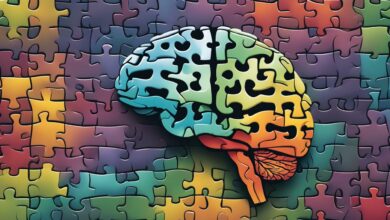Building Healthy Habits: A Lifelong Investment

Welcome to our article on building healthy habits! Maintaining good health is essential for leading a happy and fulfilling life, and developing healthy habits is key to achieving this. In this article, we will explore why healthy habits are significant in maintaining good health, discuss how to develop and sustain these habits for a healthy lifestyle, and provide expert guidance and resources to help you live your best life.
Key Takeaways:
- Healthy habits are essential for maintaining good health and well-being
- Developing positive health habits requires practical strategies and consistency
- Sustaining healthy habits over the long term involves habit stacking and accountability systems
- Breaking bad habits and forming new ones is a process that requires dedication and effort
- Healthy habits have both physical and mental benefits, and impact social well-being
Why Healthy Habits Matter for Maintaining Health
At the heart of a healthy lifestyle are healthy habits. These habits form the foundation for maintaining good health and overall well-being. But what exactly are healthy habits, and why do they matter?
Healthy habits are routine behaviors that promote physical, mental, and emotional health. Examples include regular exercise, eating a balanced diet, getting enough sleep, managing stress, and avoiding harmful substances like tobacco and excessive alcohol.
The significance of healthy habits in maintaining overall health cannot be overstated. Research has consistently shown that individuals who practice healthy habits have a significantly lower risk of chronic diseases like heart disease, diabetes, and cancer, and are more likely to live longer, healthier lives.
Moreover, healthy habits play a key role in boosting immune function, improving mental well-being, and promoting emotional resilience. By making healthy habits a priority, we can improve our quality of life and increase our chances of reaching our long-term health goals.
Why Healthy Habits Matter for Maintaining Health
Healthy habits are essential for maintaining good health and overall well-being. By incorporating healthy habits into our daily routine, we can reduce our risk of chronic diseases, promote physical, mental, and emotional health, and increase our chances of reaching our long-term health goals.
So, if you’re looking to maintain your health and live your best life, start by building healthy habits that work for you.
Developing Positive Health Habits
Developing healthy habits can be challenging, but it is essential for maintaining long-term health goals. In this section, we will provide you with expert guidance and practical tips for developing positive health habits.
The Science Behind Habit Formation
The process of forming habits is based on the brain’s ability to create neural pathways in response to repeated actions or behaviors. These pathways become stronger with each repetition, making the behavior more automatic and easier to maintain over time. With this in mind, developing healthy habits involves creating a consistent routine that reinforces positive behaviors, making them easier to sustain over the long term.
Creating a Plan for Developing Healthy Habits
Developing healthy habits requires a plan. Here are some steps to help you get started:
- Identify your health goals: Define what you want to achieve and why it’s essential to your overall well-being.
- Start small: Choose one or two habits to focus on initially. Gradually build up to more complex habits as you progress.
- Make it easy: Set yourself up for success by making your new habit easy to accomplish. For example, if your goal is to exercise regularly, start with a 10-minute walk every day and gradually increase the duration over time.
- Track your progress: Use a journal or app to track your progress, celebrate your successes, and identify any obstacles that may be preventing you from achieving your goals.
The Power of Accountability
Having someone to hold you accountable can be a powerful motivator for developing and maintaining healthy habits. Consider finding a workout buddy, joining a support group, or hiring a coach to keep you on track and focused on your goals.
Creating Positive Health Habits for a Lifetime
Developing positive health habits is not a one-time event but a lifelong journey. Here are some strategies to help you maintain your habits over time:
- Make your habits a priority: Prioritize your health and wellness by making your healthy habits a non-negotiable part of your daily routine.
- Be consistent: Consistency is key to maintaining healthy habits. Stick to your routine even when it’s challenging, and you’ll see the results over time.
- Stay motivated: Find ways to stay motivated and inspired. This could be through reading books, listening to podcasts, or surrounding yourself with supportive people.
By following these tips and strategies, you can develop positive health habits that will support your overall well-being for a lifetime.
Sustaining Healthy Habits for the Long Term
Developing healthy habits is just the beginning of your journey to a health-focused lifestyle. To truly reap the benefits, you must sustain these habits over the long term. At times, it may feel challenging, but with the right strategies, sustaining healthy habits is achievable. Here are some tips to help you stay on track and achieve your long-term health goals:
Create a Habit Stacking System
Habit stacking is the practice of linking new habits to existing ones. By pairing a new habit with an established one, you create a strong association between the two, making it easier to sustain your new habits over time. For example, if you already brush your teeth every morning, you could add a habit of doing ten minutes of stretching right after that. This way, you don’t need to plan for extra time or remember to do the habit, as you already follow your established daily routine.
Establish Accountability Systems
Accountability can be a powerful motivator in sustaining healthy habits. Find an accountability partner, someone you trust and respect, to share your journey with. Discuss your goals, progress, and challenges with your partner, and hold each other accountable. Alternatively, you can use a habit tracker app or journal to track your progress and hold yourself accountable.
Be Consistent
Consistency is key to sustaining healthy habits. Make a habit of doing your new routine every day, even if it’s just for a few minutes. This helps build momentum and increases the likelihood of staying on track. Additionally, plan for obstacles that can derail your new habits, and find ways to work around them. For example, if you travel frequently, prepare for healthy meals and exercises ahead of time.
Ask for Support
Building healthy habits can be challenging, and it’s okay to ask for help. Reach out to friends, family, or experts for advice and support. Join a fitness class, or hire a personal trainer if you need guidance on exercise routines. Seek a nutritionist if you need help with meal planning. Remember, you don’t have to do this alone.
By incorporating these strategies into your daily routine, you can stay motivated and sustain healthy habits for the long term. Remember that adopting a health-focused lifestyle is a journey, not a destination. With patience, perseverance, and support, you can achieve your long-term health goals and enjoy a happier, healthier life.
Breaking Bad Habits and Forming New Ones
Breaking bad habits is not easy; it can take time, effort, and persistence. However, with the right approach, it is possible to make positive changes to your routine and form new habits that support your overall well-being. Here are some practical steps to help you break bad habits and form new ones:
- Identify your triggers: To break a bad habit, it’s essential to identify the triggers that cause it. For example, if you tend to snack on unhealthy foods while watching TV, the TV could be the trigger. Once you identify the trigger, you can take steps to avoid it or replace it with a healthier alternative.
- Make a plan: To form a new habit, you need to have a plan. Set specific, achievable goals that are relevant to your lifestyle. For instance, if you aim to exercise regularly, create a workout schedule with clear milestones.
- Start small: Breaking bad habits and forming new ones can be overwhelming. So, start small. Focus on changing one behavior at a time. Once you have successfully changed one habit, you can move on to the next one.
- Be consistent: Consistency is the key to forming new habits. Make a commitment to practice your new habit every day, no matter how small it is. Gradually, it will become a part of your routine.
- Reward yourself: Celebrate your successes along the way. Set up a reward system to acknowledge your progress. For example, if you have successfully avoided smoking for a week, treat yourself to something you enjoy, like a movie or a favorite meal.
Remember, breaking bad habits and forming new ones takes time and effort. Be patient and persistent. And most importantly, be kind to yourself.
Expert Tip:
If you’re struggling to break a bad habit, try the “four Ds” strategy:
| Distract yourself | Delay the behavior | Do something else | Deep breathing |
|---|---|---|---|
| If you feel the urge to engage in a bad habit, distract yourself by doing something else, like taking a walk or reading a book. | Delay the behavior by telling yourself you’ll do it in five minutes. Then, repeat the process until the urge passes. | Replace the bad habit with a healthier one. For example, if you feel the urge to snack on junk food, reach for a piece of fruit instead. | Deep breathing can help reduce stress and anxiety, which can trigger bad habits. Try taking three slow, deep breaths when you feel the urge to engage in a bad habit. |
Breaking bad habits and forming new ones is possible. By identifying your triggers, making a plan, starting small, being consistent, and rewarding yourself, you can develop positive health habits that support your overall well-being.
The Physical Benefits of a Healthy Lifestyle
Adopting a healthy lifestyle has numerous physical benefits that can significantly improve your quality of life. Regular exercise, nutritious eating, and adequate rest are fundamental components of a health-focused routine that contribute to better overall health and well-being.
Regular exercise has been shown to boost energy levels, reduce the risk of chronic diseases, and promote weight management. Physical activity can also improve cardiovascular health, strengthen muscles and bones, and enhance flexibility and endurance. The American Heart Association recommends at least 150 minutes of moderate exercise or 75 minutes of vigorous exercise per week to maintain optimal health.
Nutritious eating is another critical aspect of a healthy lifestyle that can have a significant impact on physical health. Eating a balanced diet rich in fruits, vegetables, whole grains, lean proteins, and healthy fats provides essential nutrients that support the body’s functions and reduce the risk of chronic diseases. Incorporating whole foods and limiting processed foods can also help maintain a healthy weight and improve digestive health.
Adequate rest is crucial for physical health and recovery. Sleeping for at least 7-8 hours per night can boost energy levels, improve cognitive function, and enhance immune system function. Chronic sleep deprivation has been linked to a higher risk of obesity, diabetes, heart disease, and other chronic health conditions.
Incorporating these healthy habits into your daily routine can improve your physical health and well-being. By making small changes today, you can reap the benefits for years to come.
The Mental and Emotional Benefits of a Healthy Lifestyle
At its core, a healthy lifestyle involves not only physical health but also mental and emotional well-being. When we prioritize healthy habits, we are not only taking care of our bodies but also our minds and hearts.
Research has shown that a healthy lifestyle can have a positive impact on mental health by reducing the risk of depression and anxiety. Regular exercise, proper nutrition, and adequate sleep can all contribute to improved mood and reduced stress levels. In fact, studies have found that even a single exercise session can lead to a temporary boost in mood and energy.
In addition to these direct benefits, healthy habits can also indirectly improve mental and emotional health by fostering a sense of purpose and control. When we take ownership of our health and make choices that support our well-being, we feel more empowered and in control of our lives.
Healthy habits can also enhance emotional resilience and promote social connections, both of which are crucial for overall well-being. Engaging in activities that we enjoy and spending time with loved ones can help reduce feelings of loneliness and isolation, while also providing a sense of belonging and community.
Ultimately, a healthy lifestyle can have a profound impact on not only physical health but also mental and emotional well-being. By prioritizing healthy habits, we can improve our mood, reduce stress, and enhance our overall quality of life.
The Social Impact of Healthy Habits
Healthy habits not only benefit individuals but also have a positive impact on society as a whole. By cultivating a health-focused lifestyle, we contribute to the well-being of our communities and promote a culture of wellness.
Community support plays a crucial role in building and sustaining healthy habits. When we surround ourselves with like-minded individuals who prioritize health and well-being, we are more likely to stay motivated and committed to our goals. Supportive communities can provide accountability, encouragement, and resources to help us stay on track.
In addition to personal connections, institutions such as schools, workplaces, and government agencies can also play a role in promoting healthy habits. From providing healthy food options to promoting physical activity, these organizations can create environments that support and encourage healthy behaviors.
Moreover, healthy habits can have a ripple effect, inspiring others to make positive changes in their own lives. When we model healthy behaviors and share our success stories with others, we can inspire and motivate those around us to adopt healthy habits of their own.
By recognizing the social impact of healthy habits, we can take a more holistic approach to our well-being and contribute to the collective health of society.
Expert Tips for Building Healthy Habits
Building healthy habits can be challenging, but with the right strategies, it is possible to make positive changes that stick. Here are some expert tips to help you develop and maintain healthy habits:
- Start small: Rather than trying to make sweeping changes all at once, focus on making small, incremental changes that are sustainable over the long term.
- Establish a routine: Consistency is key when it comes to building healthy habits. Set a regular time for exercise, meal prep, and other health-focused activities to make them a natural part of your daily routine.
- Set attainable goals: Make sure your goals are realistic and achievable. This will help you maintain motivation and avoid feeling overwhelmed.
- Find a support system: Having a friend, family member, or health professional to support you can make a big difference in building healthy habits. Reach out to others who share your goals and interests, and consider joining a support group or online community for added accountability.
- Track your progress: Keeping track of your progress can help you stay motivated and identify areas where you need to make adjustments. Use a journal, app, or other tool to monitor your habits and track your successes.
- Be kind to yourself: Remember that building healthy habits is a process, and setbacks are a natural part of that process. Be kind to yourself, and celebrate your successes along the way.
By following these expert tips, you can build healthy habits that support your overall well-being and lead to a healthier, happier life.
Resources for Supporting Healthy Habits
At times, building healthy habits may seem like a daunting task, but with the right resources and support, it can become a natural part of your daily routine. Our team has curated a list of resources to help you maintain and sustain your health-focused lifestyle.
Books
The Power of Habit by Charles Duhigg: In this New York Times bestseller, Duhigg explores the science of habit formation and provides practical advice for developing and maintaining positive habits.
Atomic Habits by James Clear: This book offers a step-by-step guide to building good habits and breaking bad ones by focusing on small changes that lead to big results.
Websites and Apps
MyFitnessPal: This free app helps users track their daily food intake, exercise routines, and water intake. It also provides a supportive community and helpful articles to stay motivated.
Headspace: This app offers guided meditations and mindfulness exercises to help reduce stress and improve mental well-being.
Online Communities and Social Media
Joining online communities or following social media accounts focused on health and wellness can provide inspiration, motivation, and support. Some popular options include:
- r/HealthyHabits on Reddit
- @mindbodygreen on Instagram
- Wellness Mama on Facebook
Remember, building healthy habits is a journey, and the road to sustainable health can be challenging at times. Utilizing these resources can provide the guidance and support you need to stay on track and achieve your long-term health goals.
The Long-Term Benefits of Healthy Habits
Adopting and maintaining healthy habits is an investment in sustainable health. The benefits of a health-focused lifestyle are significant and long-lasting. Here are some of the top long-term benefits of healthy habits:
- Reduced risk of chronic diseases: Healthy habits, such as regular exercise and nutritious eating, are key factors in preventing chronic diseases such as heart disease, diabetes, and cancer. By maintaining a healthy lifestyle, you can significantly reduce your risk of these conditions.
- Improved quality of life: Healthy habits contribute to overall well-being, leading to improved energy levels, better mood, and enhanced cognitive function. By investing in your health, you can enjoy a higher quality of life and feel your best for years to come.
- Longevity: Studies have shown that individuals who maintain healthy habits tend to live longer and enjoy better health in their later years. By focusing on your health today, you can increase your chances of a long, healthy, and fulfilling life.
- Reduced healthcare costs: By preventing chronic diseases and maintaining good health, you can significantly reduce your healthcare costs over the long term. This can lead to significant savings and a better overall financial situation.
- Positive impact on others: By adopting healthy habits and prioritizing your well-being, you can inspire and influence others around you to do the same. Your healthy choices can have a positive impact on your loved ones, friends, and community, creating a ripple effect of good health.
By incorporating healthy habits into your daily routine, you are investing in your future health and well-being. These habits can have a profound impact on your life, leading to increased longevity, reduced healthcare costs, and a higher quality of life. So, start building your healthy habits today and enjoy the benefits for years to come.
Conclusion
In conclusion, we hope this article has emphasized the importance of building healthy habits for maintaining good health. By incorporating positive routines and sustaining them over the long term, you can achieve sustainable health, improved quality of life, and longevity.
Remember that building healthy habits is a journey, not a destination. It requires commitment, consistency, and a willingness to make small changes to your daily routine. With the expert guidance and practical tips provided in this article, we believe you have the tools necessary to make a positive change in your life.
Stay Motivated with a Community of Support
If you need additional support, we encourage you to explore the many resources available to you. Join a community of individuals with similar goals, seek the guidance of a professional in the field of health and wellness, or download an app to track and measure your progress. Remember, small changes today can lead to significant improvements in the future.
Invest in Yourself Today
Investing in your health through healthy habits is a lifelong journey worth taking. By prioritizing your physical, mental, and emotional well-being, you can live your best life and achieve your long-term health goals. So, start building your healthy habits today and enjoy the benefits for years to come.
FAQ
Q: Why are healthy habits important for maintaining health?
A: Healthy habits play a crucial role in maintaining overall health. They help prevent chronic diseases, boost immune function, and improve mental well-being.
Q: How can I develop positive health habits?
A: Developing positive health habits requires practical strategies. These include understanding habit formation, making sustainable changes to your routine, and finding accountability systems.
Q: How can I sustain healthy habits for the long term?
A: Sustaining healthy habits over the long term involves habit stacking, implementing accountability systems, and maintaining consistency in your health-focused lifestyle.
Q: How do I break bad habits and form new ones?
A: Breaking bad habits and forming new ones involve identifying unhealthy behaviors, eliminating them, and replacing them with positive habits that support your well-being.
Q: What are the physical benefits of a healthy lifestyle?
A: A healthy lifestyle offers physical benefits such as improved energy levels, weight management, and reduced risk of chronic diseases through regular exercise, nutritious eating, and adequate rest.
Q: What are the mental and emotional benefits of a healthy lifestyle?
A: A healthy lifestyle enhances mental well-being and emotional resilience through habits like mindfulness, stress management, and fostering social connections.
Q: How do healthy habits impact the community?
A: Healthy habits have a social impact by promoting community support, peer influence, and collective well-being in maintaining and sustaining healthy habits.
Q: What are some expert tips for building healthy habits?
A: Expert tips for building healthy habits include insights from professionals in the field of health and wellness, offering actionable steps to incorporate into your daily routine.
Q: What resources are available to support healthy habits?
A: There are various resources available, such as recommended books, websites, apps, and tools, to provide further guidance and motivation in building and supporting healthy habits.
Q: What are the long-term benefits of healthy habits?
A: Adopting and maintaining healthy habits leads to long-term benefits such as sustainable health, improved quality of life, and increased longevity.




